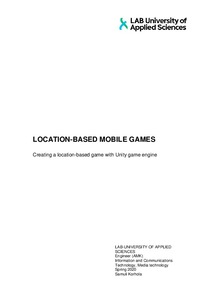Creating an optimized 3D-mesh for a stylized low-poly video game character
Pirhonen, Liisa (2024)
Pirhonen, Liisa
2024
Julkaisun pysyvä osoite on
https://urn.fi/URN:NBN:fi:amk-2024120934124
https://urn.fi/URN:NBN:fi:amk-2024120934124
Tiivistelmä
Creating 3D models for video games requires artists to balance visual fidelity while considering performance implications. In the context of low-poly models, attention to the mesh structure is vital, as a visually clear silhouette, and a polycount is critical in areas with heavy deformations. The whole low-poly character creation process requires an understanding of a 3D model’s components, topology, and the effects of mesh deformation, all while maintaining a simplistic art style. The character creation process must be managed well for the asset to support the following phases: rigging, animations, and texturing.
This thesis aimed to explore the core concepts and methodologies that can be utilized when creating a low-poly 3D game character. It also provides a set of best practices for creating production-ready game characters that consider deformations, topology, and texturing.
To accompany the theoretical part of the thesis, an organic 3D model was created for a game prototype to demonstrate the process of making a video game character with deformations. The aim of the practical project was to emphasize the importance of considering a mesh’s deformations and topology and how they can impact the visual fidelity and quality of the model during production.
The 3D model and ambient occlusion map were created using Blender, rigged and animated with Mixamo’s auto-rigger, and finally imported to Unity for evaluation. The base color and normal map were created using Clip Studio Paint. The results indicate that the 3D model’s mesh structure affects the quality of deformations and textures.
This thesis aimed to explore the core concepts and methodologies that can be utilized when creating a low-poly 3D game character. It also provides a set of best practices for creating production-ready game characters that consider deformations, topology, and texturing.
To accompany the theoretical part of the thesis, an organic 3D model was created for a game prototype to demonstrate the process of making a video game character with deformations. The aim of the practical project was to emphasize the importance of considering a mesh’s deformations and topology and how they can impact the visual fidelity and quality of the model during production.
The 3D model and ambient occlusion map were created using Blender, rigged and animated with Mixamo’s auto-rigger, and finally imported to Unity for evaluation. The base color and normal map were created using Clip Studio Paint. The results indicate that the 3D model’s mesh structure affects the quality of deformations and textures.
Kokoelmat
Samankaltainen aineisto
Näytetään aineisto, joilla on samankaltaisia nimekkeitä, tekijöitä tai asiasanoja.
-
Game Development in Unity : Game Production, Game Mechanics and the Effects of Gaming
Dansie, Jason (Metropolia Ammattikorkeakoulu, 2013)The goal of this thesis is to examine how video games are designed and to see how differ-ent game mechanics work and how to use them in the development of a game, as well as examine what are both the positive and negative ... -
Location-based mobile games : creating a location-based game with the Unity game engine
Korhola, Samuli (2020)The subject of this thesis is location-based mobile games. Location-based mobile games are a way for mobile games to combine reality with virtual worlds and thus re-define the gaming experience. This thesis presents ... -
”WE WANT A 3D GAME” : Customer expectations for the games company when buying a serious game
Sorppanen, Mikko (Oulun seudun ammattikorkeakoulu, 2012)All digital games are not used for entertainment. Some of them can also be used for non-entertainment purposes and these games are called serious games. This thesis is carried out in co-operation with one Finnish games ...



